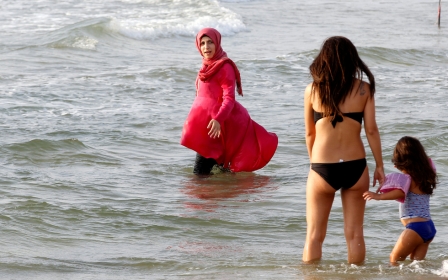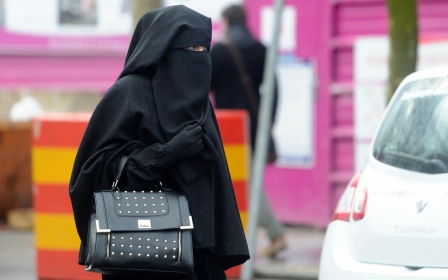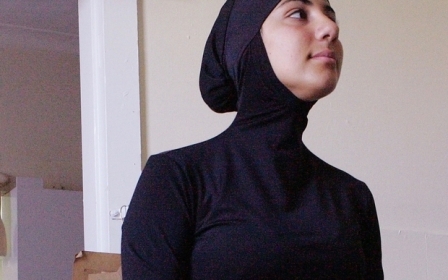French island Corsica doubles down on burkini ban

BASTIA, France - Nice, Fréjus, Cannes… all over France, anti-burkini municipal decrees have been introduced and implemented in recent weeks. On 26 August, the country’s highest administrative court, the French Council of State, suspended a burkini ban decree in Villeneuve-Loubet and called it “a serious threat to freedom and to the principle of secularism”. Following the council’s decision, other towns with burkini bans followed suit. According to the council, the fear and emotions after recent attacks in France were not solid enough arguments to maintain such a decree.
However, some magistrates, such as the Bastia administrative court on the island of Corsica, opposed the decree, and on 6 September upheld the burkini ban in the northern town of Sisco.
The burkini ban was instituted on 14 August after an altercation between a North African family sunbathing on the beach and a few of Sisco's inhabitants. Sisco's mayor decided to prohibit “the access to the beach to anybody who doesn’t wear a proper bathing suit that might be considered an offence to public morality and decency and that is against the principle of secularism”.
'Safety measure based on real life events'?
Those incidents took a serious toll on Corsica: five people were wounded, three cars were set on fire, eighty policemen were mobilised to restore calm to the region and relations remain tense in the village.
On 15 September, three Moroccan men and two people from Sisco were brought before the Bastia criminal court for gang assault. French Muslim Mustapha Benhaddou was sentenced to two years in prison, and his two brothers received suspended sentences.
There is no doubt that the altercation weighed heavily on the Bastia administrative court's decision to reject the council's decree. In this case, the magistrates justified their decision based on the violence in Sisco rather than on vague “precautionary measures” claimed by other municipalities.
The administrative court deems “a woman wearing a type of bathing suit such as the one that is prohibited by the municipal decree and given the current circumstances, could disrupt the public order, and it is up to the mayor to take measures”.
In the written judicial decision, the Bastia administrative court referenced the Council of State’s opinion that prohibiting access to the beach to some people could only be justified “if risks to maintain public order are being proven”. A high-profile human rights NGO, the Human Rights League (LDH), went to court to fight the ban and expressed deep scepticism with the grounds put forward by the Bastia administrative court.
The association says that: “If the court does not revoke the decree, while knowing that the events that are used to back up this decision have no link whatsoever with anybody wearing a burkini, it means that the court itself agrees on the fact that wearing this simple garment can actually disrupt public order.” Following the association’s statement, LDH announced it would appeal to the Council of State.
The mayor of Sisco, Ange-Pierre Vivoni, told Middle East Eye: “Unlike other cities in France, I have decided to pass this decree not based on the controversy around the burkini, which I did not even mention in the text. I am not targeting Muslim people here, this is a safety measure based on real-life events: the altercation that occurred on 13 August, during which people were wounded by harpoons. It could have come to a major disaster and the inhabitants are still very much in shock. I would like to avoid any behaviour that, in this current context, could be interpreted as a provocation”.
Do the recent events in Corsica mean that Islam is an even more sensitive topic than in other places in France? Not exactly.
On 10 September, in the Corse-Matin newspaper, Bernard Schmeltz, the government's representative in Corsica asserted that since the beginning of the attacks in France, “acts against Muslim people reported in Corsica have had the same evolution as everywhere else. They even tend to be less frequent than in the rest of France”.
‘Islam is welcome in Corsica. Not Salafism’
Jean-Guy Talamoni, pro-independence chairman and leader of the Assembly of Corsica - the island's legislative body - emphasized the danger of mixing everything together. “What happened in Sisco has nothing to do with Salafism. They were thugs who used violence to privatise a public beach. They used weapons such as harpoons, which can be regarded according to the law as an attempted homicide”.
“The difference with other parts of France is that Corsica knows how to react when it comes to such behaviours. Religion or any type of radicalisation have nothing to do with those tensions, it is rather a refusal to behave accordingly to our values”.
In December 2015, similar events took place in Corsica. On Christmas Day, hundreds of people were gathered in Ajaccio to show their support after firemen were attacked on duty in the popular and mixed-race neighbourhood named “Les Jardins de l’Empereur”. While this event was taking place, an extreme-right splinter group ransacked a Muslim prayer room in Ajaccio. According to Gilles Simeoni, the pro-autonomy chairman of the Executive Council of Corsica - the body that manages the island's budget - those incidents were “unacceptable”.
When such incidents happen, the nationalists emphasise the concept of “common destiny”, a notion that was brought forth in 1987 by the National Liberation Front of Corsica, based on the idea that Corsica’s population is a mix of “original” Corsican and “adopted” Corsican.
“We have always lived in peace and harmony on this island, and we don’t want things to change”, said Mohamed Ouahou, who is a spokesman for InterMed, a mediation association in favour of “non-violence”.
“I can understand that Sisco’s inhabitants might be confused given the way and the context in which those incidents happened. However, I don’t understand why some would say “Arabi fora” (‘Arabs get out’), a slogan heard during a march following the Sisco’s events in Bastia, that only paints everyone with the same brush”.
Jean-Guy Talamoni expresses the same feeling: “I don’t relate to that type of slogan. The concept of the Corsican society does not make room for racism since we welcome everyone”.
On 29 July, after the Nice attack, which deeply shocked the island, given how close it is, the nationalist majority of the Corsican Regional Assembly passed “a motion on public safety and Islamic fundamentalism in Corsica”, demanding that the state “close promptly every place of worship and reunions in which hatred and violence are being preached”.
A few days prior to this, the arrival of a group of Salafis turned up the heat even more. Fresh off the boat, these preachers received quite a frosty welcome and were asked by other Muslim people, among them Kader Azahaf, representative of the Moroccan Association of Bastia, “to leave the premises” of a prayer room in the city.
“Those people are not welcomed”, said Mohamed Ouahou. “We have to be able to close our doors to them. Everyone can practice their religion, but with respect and discretion, without imposing it to everyone else. Islam is welcome in Corsica but not Salafism”.
This article was originally published on Middle East Eye's French website and translated by Nassima Demiche.
New MEE newsletter: Jerusalem Dispatch
Sign up to get the latest insights and analysis on Israel-Palestine, alongside Turkey Unpacked and other MEE newsletters
Middle East Eye delivers independent and unrivalled coverage and analysis of the Middle East, North Africa and beyond. To learn more about republishing this content and the associated fees, please fill out this form. More about MEE can be found here.




